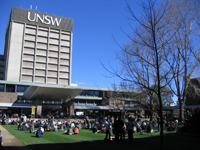|
|||||||||||
| Physiology | |||||||||||

Physiology is the study of how the normal body systems function in humans and animals. Students examine life processes and their consequences - from the molecular level through to the whole organism. Physiology is one of the major foundations of medicine and underpins biomedical study and research. Students learn about the functions of the different body systems, e.g. the Respiratory System, Cardiovascular System and Central Nervous System and their integration.
Graduates are employed in various medical and health-related settings including hospitals, as exercise physiologists, in rehabilitation, in sports institutes, government organisations, health administration and biomedical research. Studying Physiology at UNSW The study of Physiology at UNSW is a component of several undergraduate programs in the Faculty of Medicine (www.med.unsw.edu.au) and also the Bachelor of Science and the Bachelor of Medical Science in the Faculty of Science (www.science.unsw.edu.au). Please refer to the table below. Students may continue their study of physiology at a postgraduate level.
Physiology can be studied as
|
|||||||||||



